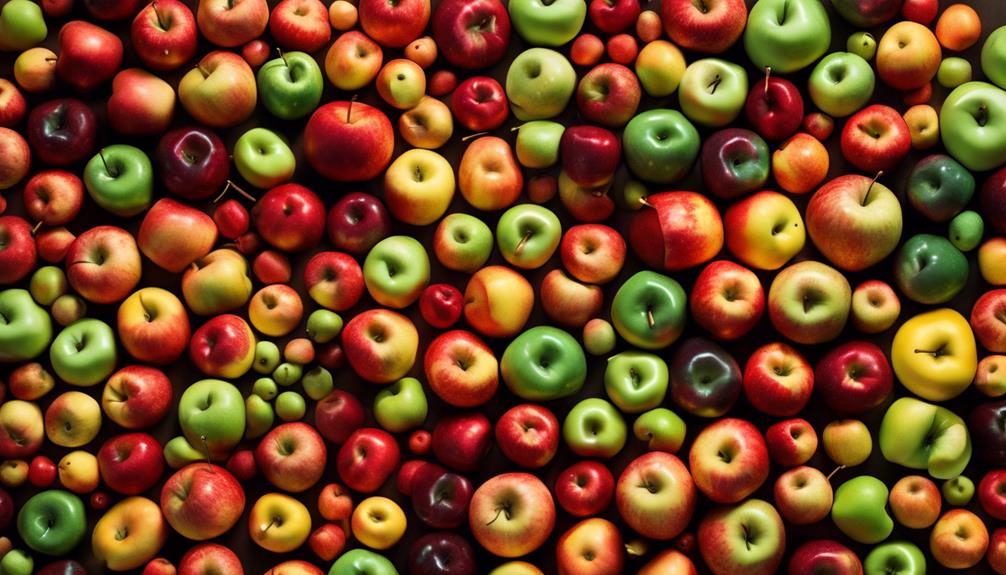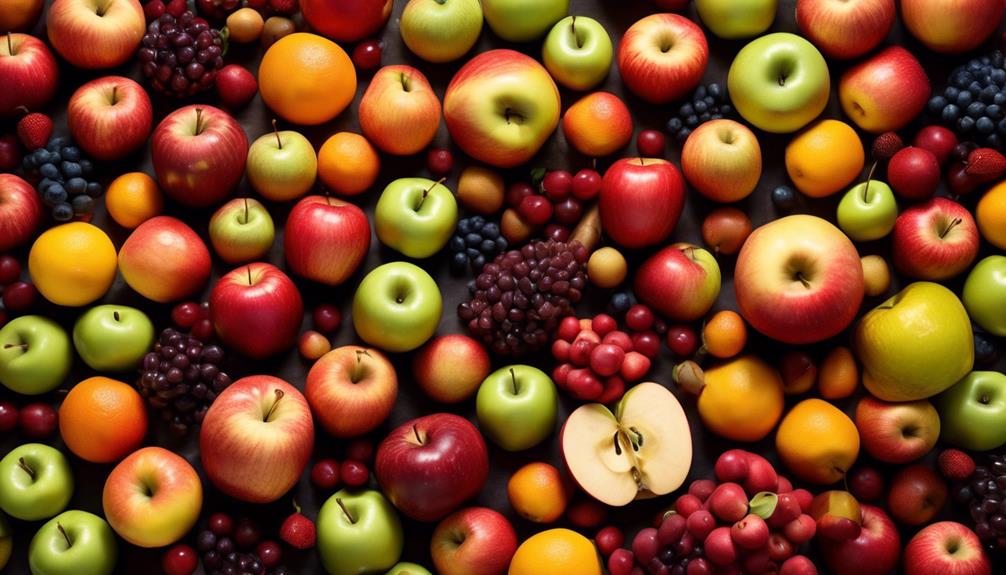Craving a crash course on collective nouns, specifically for apples? Discover the linguistic lingo that leaves you wanting more.

Collective Noun for Apples
You’ve probably heard the old adage ‘an apple a day keeps the doctor away‘, right? Well, let’s take that notion a step further and consider a whole bunch of apples.
In English, we’ve got collective nouns for everything from a murder of crows to a pod of whales, so what do we say when we’ve got more than one apple?
As you begin to explore this fascinating linguistic quirk, you might find yourself pondering the curious nature of language and the intriguing origins of collective nouns. So, what’s the collective noun for apples? Stick around and you’re in for a treat.
Key Takeaways
- Collective nouns condense communication and provide a vivid image of a group of similar items or individuals.
- The collective noun for apples is a ‘bushel’, derived from the Old French and Latin words meaning ‘small box’.
- Collective nouns for fruits, such as ‘bunch of grapes’ and ‘hand of bananas’, offer insights into the fruit itself, its arrangement, or how it’s sold.
- Collective nouns like ‘bushel of apples’ enrich descriptions, convey quantity or arrangement, and add poetry and imagery to everyday language.
Understanding Collective Nouns

To truly grasp the concept of collective nouns, you must first understand that they’re terms used to denote a group or collection of similar items or individuals as a single entity. They’re an essential component of language that helps to add specificity and efficiency to our communication.
Take for example, the term ‘orchard’. It’s a collective noun used to represent a group of fruit trees, which can include apples. Instead of saying ‘a group of apple trees’, you simply say ‘an orchard of apples’. This not only condenses your communication, but it also gives a more vivid image of the group you’re referring to.
You’ll find collective nouns in many aspects of English language, particularly in literature and formal writings. They’re often used to describe groups of animals, like a ‘flock of birds’ or a ‘school of fish’. However, they’re not limited to animals. We also use them for people (‘a team of players’) and things (‘a bunch of grapes’).
Therefore, understanding collective nouns is indispensable in mastering language use. They enhance your linguistic precision and enrich your vocabulary, offering a more sophisticated way to express groupings in your speech and writing.
Origin of Apple’s Collective Noun

Having understood the importance of collective nouns, let’s now explore the specific origin of the collective noun for apples.
The term widely used to describe a group of apples is a ‘bushel.’ This term originates from the Old French ‘boissiel’ and ‘boissel,’ both meaning ‘small box.’ It’s believed that these terms were derived from the Latin word ‘buxida,’ a diminutive of ‘box.’
The use of ‘bushel’ as a collective noun for apples became popular in the agricultural communities of the 14th century. It was used to measure a variety of goods, including grains, dry goods, and fruits such as apples. A bushel was considered a unit of measure, equivalent to 8 gallons or 32 quarts in the U.S. system.
The phrase ‘a bushel of apples’ signifies not only the quantity but also the quality and uniformity of the apples in the group. It’s a term steeped in agricultural tradition and history, and its use in English has been widespread ever since.
This gives you a unique insight into the historical and linguistic origins of this collective noun.
Comparisons With Other Fruits

In examining the collective nouns for other fruits, you’ll find fascinating contrasts and similarities to our ‘bushel of apples’. A ‘bunch of grapes’, for instance, is also a volumetric measurement, indicating a collection of grapes that isn’t necessarily counted, much like a bushel of apples. However, the term ‘bunch’ is more flexible and can apply to small clusters or large gatherings of grapes.
A ‘hand of bananas’, on the other hand, denotes a single unit, akin to the individual apple. ‘Hand’ illustrates the fruit’s peculiar shape and arrangement, mirroring a human hand’s structure, with bananas as ‘fingers’. This collective noun is more descriptive and specific, unlike the more general ‘bushel’.
Consider the ‘punnet of strawberries’, a term borrowed from the container used to measure and sell these berries. This collective noun is unique in its reference to packaging rather than the fruit’s characteristics or quantity.
Through these comparisons, you can appreciate the range of collective nouns for fruits. Each term provides insight into the fruit itself, its arrangement, or how it’s sold, offering a delightful linguistic variety to our everyday fruit discourse.
Usage in Everyday Language
As you navigate through your everyday language, you’ll find that the use of collective nouns like ‘bushel of apples’ greatly enriches your descriptions, while also subtly conveying information about the quantity or arrangement of the objects you’re discussing. These expressions aren’t merely linguistic embellishments; they’re practical tools that enable you to convey specific details with brevity.
Let’s consider the phrase ‘a bushel of apples’. It doesn’t just tell your listener that you’re talking about apples; it communicates that you’re discussing a large quantity, specifically a unit equal to eight gallons. This level of precision can be particularly useful in contexts such as recipes or shopping lists.
Furthermore, collective nouns can add a touch of poetry to your language, transforming functional communication into something more evocative. ‘A bushel of apples’ brings to mind images of autumn harvests and rustic farm stands, adding depth and colour to your conversation.
However, be mindful of your audience. Not everyone will be familiar with these terms. While ‘a bushel of apples’ might be self-explanatory, more esoteric collective nouns could cause confusion. Always strive for clarity and understanding in your communication.
Impact on English Literature

While you’re using collective nouns in everyday conversations, you mightn’t realize their profound impact on English literature. Collective nouns, such as a ‘barrel of apples’, not only enrich our language but also furnish writers with potent imagery.
In literary works, these expressions aren’t just used for their literal meanings. They often carry symbolic, cultural, and emotional weight. Take an ‘orchard of apples’ for instance. It could symbolize abundance, temptation, or the fall of man, depending on the context.
Think about how many authors utilize these terms to create vivid, lasting impressions. From Chaucer’s ‘parliament of fowls’ to Steinbeck’s ‘grapes of wrath’, collective nouns have shaped our reading experiences, making abstract ideas tangible and nuanced. It’s fascinating how a simple term can deepen the narrative, isn’t it?
Frequently Asked Questions
What Are Some Examples of Collective Nouns for Apples in Other Languages?
You’re asking for examples of collective nouns for apples in various languages.
In Spanish, you’d say ‘un montón de manzanas’ for a bunch of apples.
In Italian, it’s ‘un mazzo di mele’.
In French, ‘un tas de pommes’ is commonly used.
These phrases directly translate to a ‘heap’ or ‘bunch’ of apples, demonstrating how different languages use their own unique collective nouns to describe a group of apples.
How Have Collective Nouns for Apples Evolved Over the Years?
You’ve asked how collective nouns for apples have evolved over time. Well, language changes and adapts, and collective nouns are no different.
As society’s relationship with apples has shifted, from foraging to farming to commercial production, the group terms we use have also changed.
We’ve progressed from a ‘wild’ of apples, to a ‘crop’, and now a ‘bushel’. It’s a fascinating glimpse into our evolving language and culture.
Are There Specific Collective Nouns for Different Varieties of Apples?
You’re curious if specific collective nouns exist for different apple varieties. Unfortunately, there aren’t.
Regardless of the variety – be it Honeycrisp, Granny Smith, or Fuji – the collective noun is a ‘bushel’ or an ‘orchard’ of apples.
English doesn’t generally differentiate collective nouns based on slight variations within the same object group.
Is There Any Cultural Significance Attached to the Collective Noun for Apples?
Cultural significance can certainly be attached to collective nouns, including those for apples. In various cultures, apples symbolize knowledge, health, and abundance. Therefore, a ‘bushel’ or ‘orchard’ of apples, the collective terms, might carry these symbolic meanings.
This depends on the cultural context you’re considering, though. Remember, culture can deeply influence the interpretation and significance of even mundane items like apples.
How Does the Collective Noun for Apples Influence or Affect Apple-Related Idioms and Sayings?
You’re examining the impact of the collective term on apple-related idioms and sayings. Generally, it doesn’t directly influence them.
However, you might find that the collective term, ‘a bushel of apples’, can add a certain connotation or depth to the idioms.
It’s more about the cultural and historical context in which these idioms originated rather than the collective term itself that shapes their meanings.
Conclusion
Understanding the collective noun for apples, a ‘bushel’, is vital for precise communication.
Derived from Old English, it’s a term that sets apples apart from other fruits, and its use is seen in everyday language and literature.
Grasping the concept of this collective noun not only enriches your vocabulary, but also deepens your appreciation for the nuances of the English language.
Remember, next time you see a group of apples, you’re looking at a bushel!





Sign up